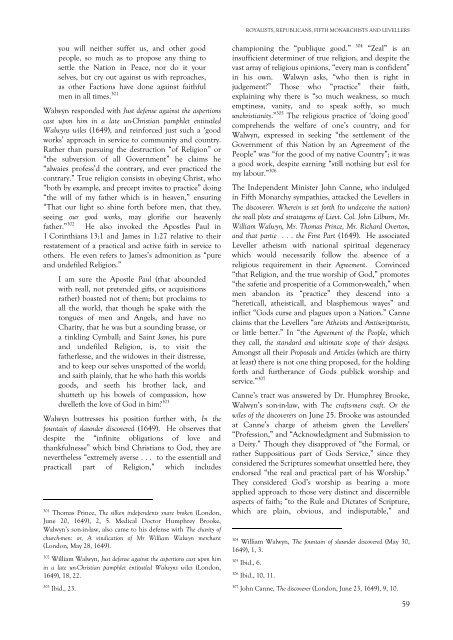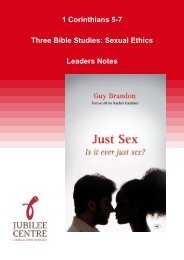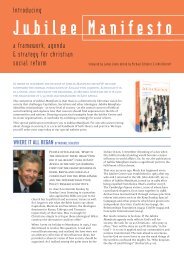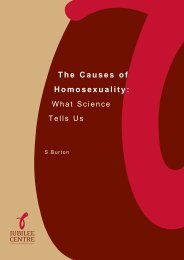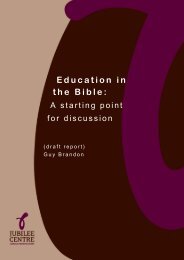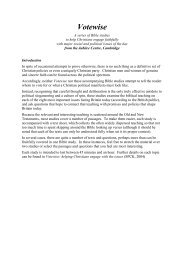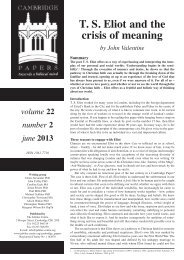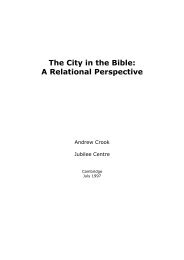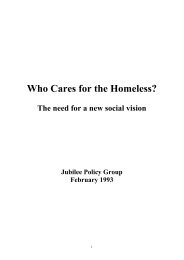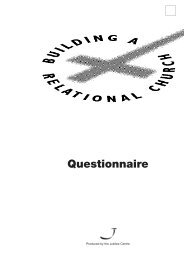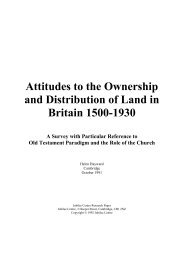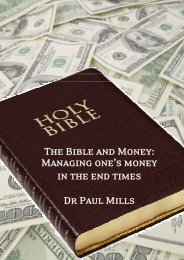Report Template - Jubilee Centre
Report Template - Jubilee Centre
Report Template - Jubilee Centre
You also want an ePaper? Increase the reach of your titles
YUMPU automatically turns print PDFs into web optimized ePapers that Google loves.
ROYALISTS, REPUBLICANS, FIFTH MONARCHISTS AND LEVELLERS<br />
you will neither suffer us, and other good<br />
people, so much as to propose any thing to<br />
settle the Nation in Peace, nor do it your<br />
selves, but cry out against us with reproaches,<br />
as other Factions have done against faithful<br />
men in all times. 301<br />
Walwyn responded with Just defense against the aspertions<br />
cast upon him in a late un-Christian pamphlet entitutled<br />
Walwyns wiles (1649), and reinforced just such a ‘good<br />
works’ approach in service to community and country.<br />
Rather than pursuing the destruction “of Religion” or<br />
“the subversion of all Government” he claims he<br />
“alwaies profess’d the contrary, and ever practiced the<br />
contrary.” True religion consists in obeying Christ, who<br />
“both by example, and precept invites to practice” doing<br />
“the will of my father which is in heaven,” ensuring<br />
“That our light so shine forth before men, that they,<br />
seeing our good works, may glorifie our heavenly<br />
father.” 302 He also invoked the Apostles Paul in<br />
1 Corinthians 13:1 and James in 1:27 relative to their<br />
restatement of a practical and active faith in service to<br />
others. He even refers to James’s admonition as “pure<br />
and undefiled Religion.”<br />
I am sure the Apostle Paul (that abounded<br />
with reall, not pretended gifts, or acquisitions<br />
rather) boasted not of them; but proclaims to<br />
all the world, that though he spake with the<br />
tongues of men and Angels, and have no<br />
Charity, that he was but a sounding brasse, or<br />
a tinkling Cymball; and Saint James, his pure<br />
and undefiled Religion, is, to visit the<br />
fatherlesse, and the widowes in their distresse,<br />
and to keep our selves unspotted of the world;<br />
and saith plainly, that he who hath this worlds<br />
goods, and seeth his brother lack, and<br />
shutteth up his bowels of compassion, how<br />
dwelleth the love of God in him? 303<br />
Walwyn buttresses his position further with, In the<br />
fountain of slaunder discovered (1649). He observes that<br />
despite the “infinite obligations of love and<br />
thankfulnesse” which bind Christians to God, they are<br />
nevertheless “extremely averse . . . to the essentiall and<br />
practicall part of Religion,” which includes<br />
301<br />
Thomas Prince, The silken independents snare broken (London,<br />
June 20, 1649), 2, 5. Medical Doctor Humphrey Brooke,<br />
Walwyn’s son-in-law, also came to his defense with The charity of<br />
church-men: or, A vindication of Mr William Walwyn merchant<br />
(London, May 28, 1649).<br />
302<br />
William Walwyn, Just defense against the aspertions cast upon him<br />
in a late un-Christian pamphlet entitutled Walwyns wiles (London,<br />
1649), 18, 22.<br />
303<br />
Ibid., 23.<br />
championing the “publique good.” 304 “Zeal” is an<br />
insufficient determiner of true religion, and despite the<br />
vast array of religious opinions, “every man is confident”<br />
in his own. Walwyn asks, “who then is right in<br />
judgement?” Those who “practice” their faith,<br />
explaining why there is “so much weakness, so much<br />
emptiness, vanity, and to speak softly, so much<br />
unchristianity.” 305 The religious practice of ‘doing good’<br />
comprehends the welfare of one’s country, and for<br />
Walwyn, expressed in seeking “the settlement of the<br />
Government of this Nation by an Agreement of the<br />
People” was “for the good of my native Country”; it was<br />
a good work, despite earning “still nothing but evil for<br />
my labour.” 306<br />
The Independent Minister John Canne, who indulged<br />
in Fifth Monarchy sympathies, attacked the Levellers in<br />
The discoverer. Wherein is set forth (to undeceive the nation)<br />
the reall plots and stratagems of Lievt. Col. John Lilburn, Mr.<br />
William Walwyn, Mr. Thomas Prince, Mr. Richard Overton,<br />
and that partie . . . the First Part (1649). He associated<br />
Leveller atheism with national spiritual degeneracy<br />
which would necessarily follow the absence of a<br />
religious requirement in their Agreement. Convinced<br />
“that Religion, and the true worship of God,” promotes<br />
“the safetie and prosperitie of a Common-wealth,” when<br />
men abandon its “practice” they descend into a<br />
“hereticall, atheisticall, and blasphemous wayes” and<br />
inflict “Gods curse and plagues upon a Nation.” Canne<br />
claims that the Levellers “are Atheists and Antiscripturists,<br />
or little better.” In “the Agreement of the People, which<br />
they call, the standard and ultimate scope of their designs.<br />
Amongst all their Proposals and Articles (which are thirty<br />
at least) there is not one thing proposed, for the holding<br />
forth and furtherance of Gods publick worship and<br />
service.” 307<br />
Canne’s tract was answered by Dr. Humphrey Brooke,<br />
Walwyn’s son-in-law, with The crafts-mens craft. Or the<br />
wiles of the discoverers on June 25. Brooke was astounded<br />
at Canne’s charge of atheism given the Levellers’<br />
“Profession,” and “Acknowledgment and Submission to<br />
a Deity.” Though they disapproved of “the Formal, or<br />
rather Suppositious part of Gods Service,” since they<br />
considered the Scriptures somewhat unsettled here, they<br />
endorsed “the real and practical part of his Worship.”<br />
They considered God’s worship as bearing a more<br />
applied approach to those very distinct and discernible<br />
aspects of faith; “to the Rule and Dictates of Scripture,<br />
which are plain, obvious, and indisputable,” and<br />
304<br />
William Walwyn, The fountain of slaunder discovered (May 30,<br />
1649), 1, 3.<br />
305<br />
Ibid., 6.<br />
306<br />
Ibid., 10, 11.<br />
307<br />
John Canne, The discoverer (London, June 23, 1649), 9, 10.<br />
59


